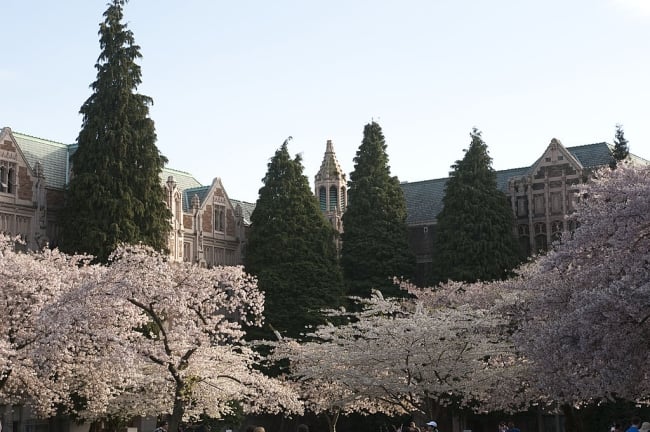You have /5 articles left.
Sign up for a free account or log in.

The University of Washington's Seattle campus
Wolfgang Kaehler/LightRocket via Getty Images
UPDATE: The University of Washington announced on Friday that starting Monday, March 9, all classes and finals on its campuses will be held remotely, rather than in person. The social distancing measure will remain in place until at least March 20, the end of the university's winter quarter. the university's three campuses, which include residence halls, hospitals and gyms, will otherwise remain open with athletic events proceeding as scheduled.
"We plan to resume normal class operations when spring quarter begins March 30, pending public health guidance," the university said in a written statement.
*******
The University of Washington is, among higher education institutions, somewhat of a ground zero for the new coronavirus. Of the 11 people killed by the virus in the United States, 10 were in Washington State.
Last week an online petition was posted asking the university, which enrolls 59,000 students on three campuses, to close. It had nearly 24,000 signatures on Thursday.
Behind the scenes, many colleges have been planning and prepping for a potential escalation of the outbreak. College officials are tasked both with maintaining the safety of students and staff and with limiting the virus’s spread beyond campus. Traditional-age college students are not at a high risk of dying of the disease the virus causes, known as COVID-19, but the people they come in contact with -- grandparents, immunocompromised strangers -- may be.
At Washington, an advisory committee on communicable diseases, chaired by a medical expert and with representation from different campus units, has been preparing for just this situation for decades. The group meets regularly under normal circumstances but is now doing so daily.
A leadership team at the university is similarly meeting every day to go over recommendations from the advisory committee. And the university has coronavirus plans in place for its food service, police, housing and hospital operations.
“Everything is on the table for us, because we are really cooperating incredibly closely with the public health agencies in Seattle,” said Denzil Suite, UW’s vice president for student life. “We are not either predicting or precluding any course of action at this point.”
Despite the pressure from students and some faculty members, who said they signed the closure petition because they felt unsafe, university officials emphasized that only recommendations from public health officials will lead to a suspension of operations. (A spokesperson for the university said the campus never truly “closes,” as it is a public space that houses thousands of students and a hospital.)
Suite added that if the university’s own medical experts, at the hospital and elsewhere on campus, were to recommend a suspension while government agencies did not, that guidance would be taken seriously.
Currently, the university has an extensive coronavirus website, including answers to common questions and looking ahead at potential hypotheticals. Suite said the campuses are prepared with emergency relocation spaces -- spread throughout the university’s housing stock -- that could be used in the event that students need to be relocated.
Other universities also have put out extensive guidance for their communities. The University of California system’s latest coronavirus information document is 19 pages long, for example.
Chuck Staben, a biology professor and former president of the University of Idaho (and an occasional columnist for Inside Higher Ed), said that in order to work how they’re intended, university plans need some level of granularity at this point.
“Let’s say you move classes online,” he said. “You do some form of live classes over a communication utility like Zoom. Do you have an enterprise license for Zoom that’s going to allow you to do that, or do you have a more limited license?” And recording video for students to watch might stretch the boundaries of what a college’s learning management system is capable of, he said.
Leadership should also be considering older faculty, Staben said, who face a greater health risk than their students from the worst effects of the virus and may feel unsafe coming to class.
He noted that beyond faculty and students, universities should also consider staff members who can’t work remotely. Food service and facilities workers need to be on campus and often aren’t granted the financial and scheduling flexibility to stay home when sick, potentially putting them at risk for spreading the virus.
“If we go into some form of isolation, you are still going to need people to clean the bathrooms and make the food and keep the lights on,” he said. “How do you protect those people?”
“It’s hard to write down a plan for everything that can happen,” he said. “The structure may need to be fairly flexible and appropriate for the situation.”








